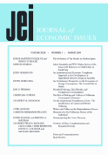
JOURNAL OF ECONOMIC ISSUES
Scope & Guideline
Exploring innovative ideas that shape economic discourse.
Introduction
Aims and Scopes
- Institutional Economics:
The journal emphasizes the role of institutions in shaping economic behavior, exploring how institutional frameworks can influence economic outcomes and social welfare. - Heterodox Economic Perspectives:
It promotes alternative economic theories and critiques of mainstream economics, offering a platform for discussing new and evolving economic paradigms. - Interdisciplinary Approaches:
The journal encourages interdisciplinary research that integrates insights from sociology, political science, and environmental studies into economic analysis. - Empirical Analysis and Case Studies:
Research published often employs empirical methodologies, including case studies, to provide evidence-based insights into economic phenomena. - Social Justice and Economic Inequality:
A key focus is on issues of inequality, examining how economic systems perpetuate disparities and exploring policy solutions for a more equitable society. - Sustainability and Environmental Economics:
The journal addresses the economic dimensions of sustainability, including the impacts of climate change and the role of economic systems in ecological preservation.
Trending and Emerging
- Climate Economics and Sustainability:
There is an increasing emphasis on the economic implications of climate change, sustainability practices, and the transition to green economies, highlighting the urgency of these issues. - Social Justice and Equity in Economics:
Research addressing social justice, equity, and the role of economic systems in perpetuating or alleviating inequality is on the rise, reflecting a broader societal concern. - Financialization and its Impacts:
The exploration of financialization—how financial motives, financial markets, and financial institutions shape economic behavior—is becoming more prevalent, particularly in relation to its effects on labor and production. - Digital Economy and Technological Change:
Emerging discussions around the digital economy, including the impacts of artificial intelligence and cryptocurrency, are gaining momentum, reflecting rapid technological advancements. - Institutional Change and Adaptation:
There is growing interest in how institutions evolve in response to economic challenges, including the COVID-19 pandemic, emphasizing the dynamic nature of institutional economics. - Neoliberalism Critique:
A surge in critical analyses of neoliberalism and its implications for economic policy and social structures is evident, indicating a shift towards questioning established economic paradigms.
Declining or Waning
- Traditional Neoclassical Economics:
There has been a noticeable decline in papers that strictly adhere to neoclassical economic theories, as the journal increasingly favors heterodox approaches. - Purely Theoretical Economic Models:
Research that focuses solely on abstract theoretical models without empirical validation or real-world application has decreased, reflecting a shift towards more applied economics. - Conventional Monetary Policy Discussions:
Discussions centered around conventional monetary policy frameworks have waned, likely due to a growing interest in alternative monetary theories and practices. - Globalization as a Universal Good:
The optimistic view of globalization as a purely beneficial force in economics is less frequently discussed, with more critical analyses of its impacts emerging instead. - Single-Factor Explanations for Economic Phenomena:
There is a decline in research that attempts to explain economic issues through a single lens or factor, indicating a shift towards more complex, multifactorial analyses.
Similar Journals

PSL Quarterly Review
Fostering Innovation Across DisciplinesPSL Quarterly Review, published by ASSOC PAOLO SYLOS LABINI, is a distinguished open-access journal based in Italy, dedicated to fostering discourse in multifaceted fields such as Business, Management, and Accounting, as well as Economics and Law. Since its inception in 2009, the journal has carved a niche in academia, providing a platform for innovative research and critical thought. With an impactful presence reflected in its 2023 Scopus ranks, including Q3 classifications in Business, Management, Accounting, and Economics, alongside a Q2 classification in Law, the PSL Quarterly Review serves as a vital resource for scholars and practitioners alike. The journal aims to bridge the gap between theoretical frameworks and practical applications, thus enriching the repertoire of contemporary economic and legal studies. Its broad accessibility and commitment to quality scholarship ensure that it remains a pivotal publication for those engaged in advancing knowledge across relevant disciplines.
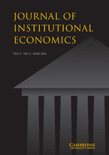
Journal of Institutional Economics
Unraveling the Impact of Institutions on Economic SystemsJournal of Institutional Economics, published by Cambridge University Press, stands as a premier forum for the dissemination of research at the intersection of economics, institutions, and governance. With an ISSN of 1744-1374 and E-ISSN 1744-1382, this journal has established itself as a vital resource within the academic community, achieving an impressive Q1 ranking in the field of Economics, Econometrics and Finance as of 2023. The journal's focus on institutional analysis not only enhances our understanding of economic phenomena but also fosters interdisciplinary dialogue among scholars and practitioners alike. With a commendable rank of 39 out of 288 in Scopus rankings, placing it in the 86th percentile, the Journal of Institutional Economics provides access to groundbreaking research that holds significant implications for policy and decision-making. Researchers, professionals, and students engaged in the study of economic systems will find this journal an invaluable addition to their academic resources.

International Advances in Economic Research
Exploring Innovative Theories and Practices in EconomicsInternational Advances in Economic Research, published by SPRINGER, stands as a significant resource within the field of economics and econometrics, consistently contributing to the theoretical and empirical understanding of economic phenomena since its inception in 1995. With an ISSN of 1083-0898 and E-ISSN of 1573-966X, this journal is dedicated to advancing economic research through a rigorous peer-review process and disseminating high-quality scholarly articles. The journal's esteemed classification places it in the third quartile (Q3) within the Economics and Econometrics category for 2023, indicating its respectable standing in academic circles. It serves as an important conduit for the dissemination of innovative economic theories, data analysis, and policy discussions, appealing to researchers, professionals, and students alike. Though not an open-access journal, it provides valuable subscription-based content that enriches the understanding of diverse economic issues and fosters a community of inquiry among academics. With its projected outlook extending to 2024, International Advances in Economic Research continues to be an essential platform for scholars aiming to influence and engage with contemporary economic debates.

Seoul Journal of Economics
Advancing Economic Scholarship for a Global ImpactThe Seoul Journal of Economics, published by the Seoul National University Institute of Economic Research, stands as a significant peer-reviewed platform for advancing scholarship in the fields of economics, econometrics, and finance. As evidenced by its Q2 ranking in the Economics category for 2023, this journal plays a crucial role in disseminating high-quality research and fostering intellectual dialogue amongst scholars and practitioners. With a commitment to bridging theoretical frameworks and empirical findings, the journal covers a diverse array of topics central to modern economic inquiry. While the journal is not open access, it provides vital insights into the rapidly evolving economic landscape in South Korea and beyond, making it a valuable resource for researchers, professionals, and students who seek to enhance their understanding of contemporary economic challenges and methodologies. With its focus on collaboration and rigorous academic discourse, the Seoul Journal of Economics contributes significantly to the global economic knowledge base, encouraging impactful research that influences policy and practice.
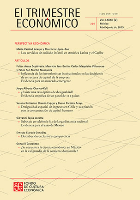
TRIMESTRE ECONOMICO
Advancing Economic Knowledge, One Issue at a Time.TRIMESTRE ECONOMICO, published by FONDO CULTURA ECONOMICA, is a prominent open access journal in the field of Economics and Econometrics based in Mexico. Since its inception in 1979, this journal has served as a critical platform for disseminating scholarly research and theoretical advancements within economic sciences, addressing both contemporary issues and historical perspectives. With an impact factor that ranks it within the Q3 category among 716 journals in its field, TRIMESTRE ECONOMICO continues to contribute significantly to the academic community, providing readers with insights into economic modeling, policy analysis, and empirical research. The journal has embraced open access since 2011, fostering a broad reach and encouraging innovation and collaboration among researchers, professionals, and students. It is essential reading for those seeking to deepen their understanding of economic trends and theories, making valuable contributions to both local and global discussions.

MANCHESTER SCHOOL
Exploring the frontiers of economics and econometrics.MANCHESTER SCHOOL, published by WILEY, is a leading academic journal in the field of Economics and Econometrics, with a rich legacy dating back to 1930. This esteemed journal fosters scholarly discourse by providing a platform for high-quality research articles that cover a broad spectrum of economic theories, empirical studies, and methodological advancements. With an impact factor reflective of its relevance and rigor, MANCHESTER SCHOOL is ranked in the Q3 category in Economics and Econometrics and holds a Scopus rank of #447 out of 716, placing it in the 37th percentile. Researchers and practitioners alike can access a wealth of knowledge through its diverse range of articles, contributing significantly to the advancement of economic science. While it does not offer Open Access options, the journal maintains a commitment to accessibility by providing in-depth analyses and discussions that are crucial for understanding contemporary economic challenges. Based in the United Kingdom, MANCHESTER SCHOOL continues to uphold its standard of excellence well into 2024 and beyond.
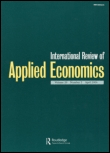
International Review of Applied Economics
Driving Policy Change with Empirical EvidenceInternational Review of Applied Economics is a leading journal dedicated to the dissemination of innovative research in the fields of economics and econometrics. Published by Routledge Journals, a renowned name in academic publishing under Taylor & Francis Ltd., this journal has established itself as a key resource for scholars, practitioners, and decision-makers. With an impressive Q2 ranking in the category of Economics and Econometrics, and positioned in the 70th percentile based on Scopus rankings, it provides a platform for high-quality, peer-reviewed articles that address contemporary economic issues. The journal aims to facilitate the understanding of applied economic theory and practice, and it accepts a diverse range of contributions including empirical studies, theoretical analyses, and methodological advancements. Operating from the United Kingdom, it has been a significant contributor to the academic dialogue since its inception in 1987, fostering knowledge exchange through rigorous scholarship. Researchers, professionals, and students alike will find valuable insights that inform policy-making and economic strategy in its pages.
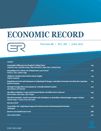
ECONOMIC RECORD
Illuminating Trends in Economic ThoughtECONOMIC RECORD is a distinguished academic journal published by Wiley that has been a vital resource in the field of economics since its inception in 1925. With a focus on disseminating high-quality research, the journal covers a broad range of topics within economics and econometrics, making it an essential platform for scholars, professionals, and students alike. Although it currently does not offer open access, the journal is indexed in leading databases and maintains a respectable Q3 category ranking in the Economics and Econometrics field for 2023. The publication operates on a biennial timeline, continuing to contribute significantly to the literature from 1934 to 2024. Researchers will find its rigorous peer-review process ensures that only impactful studies are included, providing a reliable source for current trends and advancements in economic theory and practice. Located in the United Kingdom, ECONOMIC RECORD is dedicated to fostering an environment of academic excellence and innovation in the economics discipline.
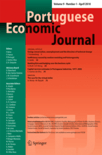
Portuguese Economic Journal
Cultivating Knowledge in the Dynamic World of EconomicsWelcome to the Portuguese Economic Journal, a renowned publication in the field of economics, published by SPRINGER HEIDELBERG. With an ISSN of 1617-982X and flexible access options, this journal serves as a pivotal platform for both established and emerging researchers. Spanning a broad range of topics within Economics, Econometrics, and Finance, the journal has successfully converged from 2005 to 2024, positioning itself in Q3 for Economics and Econometrics and Q2 in Economics, Econometrics and Finance (miscellaneous) as per the latest 2023 category quartiles. It is ranked 68th out of 288 in the Scopus list for General Economics, highlighting its significant place in the academic landscape. Based in Germany, the journal fosters a global dialogue on economic issues, making it an invaluable resource for researchers, professionals, and students seeking to engage with contemporary economic discussions. Join our community as we explore innovative economic theories, data-driven analyses, and practical applications to contribute to the advancement of the field.

Applied Economics Journal
Fostering collaboration in the pursuit of economic knowledge.Applied Economics Journal is a premier academic publication dedicated to the advancement and dissemination of research in the field of applied economics. Published by Kasetsart University, Faculty of Economics, this journal serves as a vital platform for scholars, professionals, and students eager to explore current economic theories and their practical applications in diverse contexts. With its Open Access policy, the journal ensures that high-quality research is accessible to a global audience, encouraging knowledge sharing and collaboration. Although the journal is in its early stages with a developing HIndex, it is poised to become a key resource in the economic research community, fostering innovative approaches to real-world economic challenges. The journal welcomes submissions that delve into various aspects of applied economics, aiming to enhance understanding and contribute to policymaking and economic strategies across different sectors.